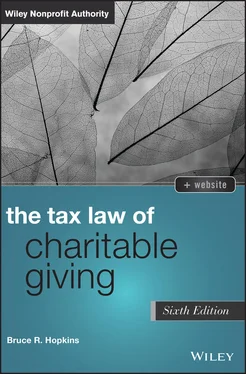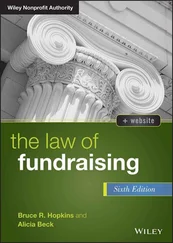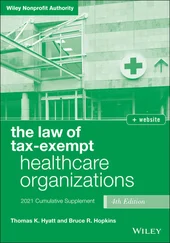Bruce R. Hopkins - The Tax Law of Charitable Giving
Здесь есть возможность читать онлайн «Bruce R. Hopkins - The Tax Law of Charitable Giving» — ознакомительный отрывок электронной книги совершенно бесплатно, а после прочтения отрывка купить полную версию. В некоторых случаях можно слушать аудио, скачать через торрент в формате fb2 и присутствует краткое содержание. Жанр: unrecognised, на английском языке. Описание произведения, (предисловие) а так же отзывы посетителей доступны на портале библиотеки ЛибКат.
- Название:The Tax Law of Charitable Giving
- Автор:
- Жанр:
- Год:неизвестен
- ISBN:нет данных
- Рейтинг книги:5 / 5. Голосов: 1
-
Избранное:Добавить в избранное
- Отзывы:
-
Ваша оценка:
- 100
- 1
- 2
- 3
- 4
- 5
The Tax Law of Charitable Giving: краткое содержание, описание и аннотация
Предлагаем к чтению аннотацию, описание, краткое содержание или предисловие (зависит от того, что написал сам автор книги «The Tax Law of Charitable Giving»). Если вы не нашли необходимую информацию о книге — напишите в комментариях, мы постараемся отыскать её.
The Tax Law of Charitable Giving — читать онлайн ознакомительный отрывок
Ниже представлен текст книги, разбитый по страницам. Система сохранения места последней прочитанной страницы, позволяет с удобством читать онлайн бесплатно книгу «The Tax Law of Charitable Giving», без необходимости каждый раз заново искать на чём Вы остановились. Поставьте закладку, и сможете в любой момент перейти на страницу, на которой закончили чтение.
Интервал:
Закладка:
§ 4.11 CONTRIBUTIONS OF STOCK OPTIONS
For-profit corporations may pledge stock options to charitable organizations. These transactions can generate tax law issues, particularly if the donee is a disqualified person with respect to the donor, such as by being a substantial contributor. 54 These issues of law include the timing of the resulting charitable contribution deduction. This aspect of the law is reflected in an IRS private letter ruling. 55
In this instance, a for-profit publicly traded corporation established a private foundation as its charitable giving vehicle. This corporation, being a substantial contributor to the foundation, was a disqualified person with respect to it. The corporation proposed to pledge to the foundation stock options for the purchase of shares of common stock of the corporation; the corporation did not receive any consideration for this pledge. The business purpose underlying the pledge was to further the charitable purpose of the foundation and other charitable organizations.
The options will be exercisable at a price specified in a stock option pledge agreement. This private foundation will not exercise the options directly because payment of the purchase price to the corporation would be an act of self-dealing. 56 Rather, the foundation will either transfer the options to one or more unrelated public charitable organizations or engage in a cashless “net exercise” transaction with the corporation. Pursuant to this net exercise procedure, the holder of options would elect to receive shares of the corporation's stock in an amount equal to the net value of the options being exercised on the date of exercise. This net value of the options is calculated by subtracting the exercise price for the number of the options being exercised from the value of the shares that the holder would have received as the result of a direct exercise. If the holder were to elect the net exercise procedure, the holder would notify the corporation of the number of options being exercised, along with written notice of its election to use the procedure, and the corporation would issue to the holder the number of shares of the corporation's stock computed using a formula specified in the option pledge agreement.
The foundation may sell the stock options to an unrelated charity for a fair market value price, with the value of the option affected by the terms in the option pledge agreement. Alternatively, the foundation may grant options to an unrelated charity, with the grantee expected to exercise the options prior to their expiration.
The IRS ruled that the pledge of the stock options by the corporation to the foundation did not constitute self-dealing because of the absence of consideration and because of the charitable purposes to be served. The pledges are not extensions of credit. 57 The net exercise procedure does not entail a sale or exchange, the IRS concluded, so there would not be self-dealing for that reason. The sale of an option by the foundation to an unrelated charity would not be self-dealing inasmuch as the cancellation of the enforceable pledge would be for consideration paid by a nondisqualified person or an entity not controlled by a disqualified person. The exercise of a stock option by an unrelated charity also would not constitute self-dealing.
Stock options are not assets susceptible of use to produce interest, dividends, rents, or royalties. Thus, the proceeds received by the foundation from the sale of stock options to an unrelated charity would be excluded from the computation of the foundation's net investment income for tax purposes. 58 The IRS ruled that the gain on the sale of stock options would be excluded from the computation of the foundation's unrelated business income. 59
The IRS ruled that, if the foundation transfers the options to an unrelated charitable organization and that charity engages in a cash exercise of the options, the corporation will be entitled to a federal income tax charitable deduction only on the exercise of the options by the unrelated charity. Moreover, the agency held that this deduction will be for an amount equal to the difference between the exercise price and the fair market value of the corporation's stock transferred on the exercise. The IRS also ruled that, if the foundation engages in a net exercise of the options, the corporation will be entitled to a charitable contribution deduction only at the time of the exercise. This deduction will be for an amount equal to the fair market value of the corporation's stock transferred to the foundation on the exercise. The IRS further ruled that, if the foundation transfers the options to an unrelated charity and that charity engages in a net exercise of the options, the corporation will be entitled to a charitable deduction only at the time of the net exercise. This deduction will be for an amount equal to the fair market value of the corporation's stock transferred to the charitable organization on the net exercise.
§ 4.12 CONTRIBUTIONS OF CREDIT CARD REBATES
A deductible charitable contribution can arise when the user of a credit card causes a percentage of the price of an item purchased with the card at a participating retailer to be transferred, by the company sponsoring the card, to a charitable organization selected by the cardholder. 60
A cardholder may claim the deduction for the tax year in which the company made payments to one or more charitable organizations on the cardholder's behalf. The company is not functioning as an agent for the donee charities. Instead, the company serves as agent for the cardholders with respect to the rebate amounts it holds. Thus, although the rebates are held by the company, the cardholders retain control over them.
For a charitable gift to be deductible, there must be the requisite delivery. It is not enough for there to be delivery to a party for subsequent delivery to a charitable organization. Accordingly, there is no delivery of a charitable contribution when the company receives the rebate amounts, nor when cardholders fail to claim rebates for their personal use. Rather, delivery occurs when the company transfers the rebate funds to the designated charities. (If the company served as the agent of the charities, the charitable deduction would arise at the time the company received the rebate amounts.) This program is designed to allow individuals to have the charitable deduction in the year of the rebate by enabling the company to transfer the rebates to charities before the close of the tax year.
§ 4.13 CONTRIBUTIONS OF TANGIBLE PERSONAL PROPERTY
A person may make deductible gifts of tangible personal property to a charitable organization. Items of tangible personal property include works of art, furniture, automobiles, and clothing.
Usually, there is no formal system in law for the recording and transfer of an item of tangible personal property. (The obvious exception, of course, is the title requirements involving motor vehicles.) In appropriate circumstances, however, title transfer of tangible personal property to a charitable organization can be evidenced by the making of a deed of gift.
§ 4.14 CONTRIBUTIONS OF REAL PROPERTY
A person may contribute real property to a charitable organization and receive an income tax charitable deduction. There is, of course, a formal system in law for the recording and transfer of title to parcels of real estate; transfers of real property are generally effected by means of deeds. Thus, the availability of this type of federal charitable contribution deduction may turn on compliance with state law. 61
As to the timing of the deduction, the contribution for a gift of real property generally occurs on the date the donor delivers a deed to the property to the charitable donee. 62 State law varies as to whether recording of a deed is necessary to make the transfer complete. 63
Читать дальшеИнтервал:
Закладка:
Похожие книги на «The Tax Law of Charitable Giving»
Представляем Вашему вниманию похожие книги на «The Tax Law of Charitable Giving» списком для выбора. Мы отобрали схожую по названию и смыслу литературу в надежде предоставить читателям больше вариантов отыскать новые, интересные, ещё непрочитанные произведения.
Обсуждение, отзывы о книге «The Tax Law of Charitable Giving» и просто собственные мнения читателей. Оставьте ваши комментарии, напишите, что Вы думаете о произведении, его смысле или главных героях. Укажите что конкретно понравилось, а что нет, и почему Вы так считаете.












